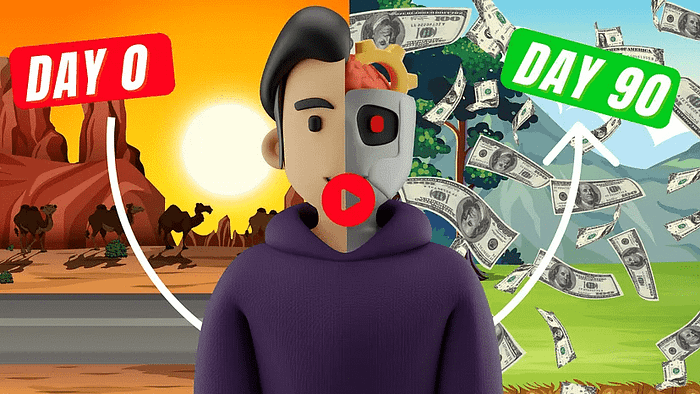5 Things I Did to Stop Wasting My Evenings After Work: A Professional’s Guide to Reclaiming Time
Life transforms dramatically when you learn to stop wasting precious evening hours, especially after dedicating most of your day to professional commitments. Through years of experience in high-pressure corporate environments, particularly in banking, the delicate balance between career demands and personal aspirations became increasingly challenging. The desire to build a thriving business, maintain meaningful relationships, prioritize health through regular workouts, and nurture personal growth seemed like an insurmountable challenge until discovering game-changing strategies that revolutionized post-work hours.
The journey to stop wasting valuable evening time began with a stark realization that life had become a monotonous cycle of work and preparation for the next workday. The exhaustion from demanding corporate responsibilities often led to mindless scrolling through social media or binge-watching content, leaving little room for meaningful activities or personal development. This pattern needed to change, and through careful observation and implementation, five powerful solutions emerged that completely transformed the approach to managing time after work.
We strongly recommend that you check out our guide on how to take advantage of AI in today’s passive income economy.
Table of Contents
1. Rewriting Your Default Settings: Breaking the Mood-Action Connection
Understanding the Psychology Behind Evening Productivity
The most significant breakthrough in learning to stop wasting evenings came from understanding that actions don’t have to be dictated by mood. Most people automatically link their emotional state to their productivity, creating an unbreakable chain that limits potential. When feeling tired or stressed after work, the default response typically involves postponing important tasks or seeking immediate comfort through passive activities. However, this programming can be rewired through a conscious effort to separate feelings from actions.
The transformation begins by acknowledging that being tired doesn’t equate to being incapable. Instead of letting fatigue dictate the evening’s outcome, embracing the mindset that productivity can coexist with exhaustion opens new possibilities. This approach doesn’t deny or suppress feelings but rather creates a new relationship with them. The evidence of this possibility exists in countless scenarios where we’ve pushed through fatigue to meet deadlines or maintained workout routines despite low motivation.
2. Optimizing Life Mathematics: The Three-Bucket System
Balancing Fundamentals, Fun, and Future
Understanding the distribution of time, energy, and resources revolutionizes how we stop wasting valuable hours. Every aspect of life falls into three distinct categories: fundamentals (basic needs and maintenance), fun (social activities and hobbies), and future (personal growth and investments). This framework provides clarity in identifying where time potentially leaks and how to plug these gaps effectively.
The challenge lies in the disproportionate amount of time consumed by fundamental tasks. Learning to optimize these essential activities through strategic planning and efficient execution creates space for meaningful pursuits. The implementation of bulk organization, particularly dedicating specific times for household management, transforms scattered daily tasks into concentrated productivity sessions. This approach helps stop wasting time on repetitive daily chores and creates substantial blocks of free time for personal development and enjoyment.
3. Strategic First Destinations: Avoiding the Evening Time Trap
Reimagining Post-Work Routines
The critical moment that determines whether an evening will be productive or wasted often occurs in the first few minutes after work. The gravitational pull of comfortable spaces, particularly the couch, can transform a quick rest into hours of inactivity. Understanding this pattern leads to implementing strategic changes in post-work destinations, effectively helping to stop wasting these crucial transition hours.
Environmental cues play a significant role in behavioral patterns, as supported by extensive research. By consciously choosing productive first destinations after work, such as a library, gym, or dedicated workspace, the pattern of evening time wastage breaks naturally. This strategy doesn’t require fighting against comfort-seeking instincts but rather redirects them toward more constructive environments.
4. Maximizing Peak Performance Hours: The Morning Advantage
Leveraging Natural Energy Patterns
While focusing on how to stop wasting evening hours remains crucial, recognizing the superior value of morning hours revolutionizes productivity. Morning hours, characterized by fewer distractions and renewed mental energy, often yield significantly better results than forced evening productivity sessions. This realization leads to a strategic reallocation of important tasks to these premium hours.
The comparison between morning and evening productivity reveals stark differences in focus quality and output. Morning work sessions, typically free from social media notifications and external interruptions, provide an environment conducive to deep work. This insight helps stop wasting energy on less efficient evening work sessions and instead maximizes natural productivity patterns.
5. Foundation Respect: The Core of Evening Productivity
Nurturing Physical and Mental Well-being
The ability to stop wasting evenings fundamentally depends on maintaining optimal physical and mental health. Without proper self-care, including adequate sleep, nutrition, and exercise, attempting to be productive after work becomes an uphill battle. This foundation determines the quality of evening hours and the capacity to engage in meaningful activities.
The impact of lifestyle choices on evening productivity cannot be overstated. Proper nutrition, regular exercise, adequate hydration, and sufficient sleep create the energy reserves necessary for post-work activities. This holistic approach to well-being transforms evening hours from recovery time to opportunity periods for personal growth and enjoyment.
Conclusion
Implementing these five strategies creates a sustainable framework for maximizing evening hours and stopping the cycle of wasted time after work. The journey involves more than just time management; it requires a fundamental shift in mindset, habits, and self-care practices. By rewriting default settings, optimizing daily tasks, choosing strategic environments, leveraging natural energy patterns, and maintaining a strong foundation of well-being, evenings transform from lost hours into valuable opportunities for personal growth and fulfillment.
Success in reclaiming evening hours doesn’t happen overnight, but with consistent application of these principles, significant changes emerge. The ability to stop wasting time after work opens doors to pursuing passion projects, building meaningful relationships, and creating a more balanced, fulfilling life. Remember, every evening presents a new opportunity to invest in yourself and your future, making each moment count toward your larger life goals.

We strongly recommend that you check out our guide on how to take advantage of AI in today’s passive income economy.




